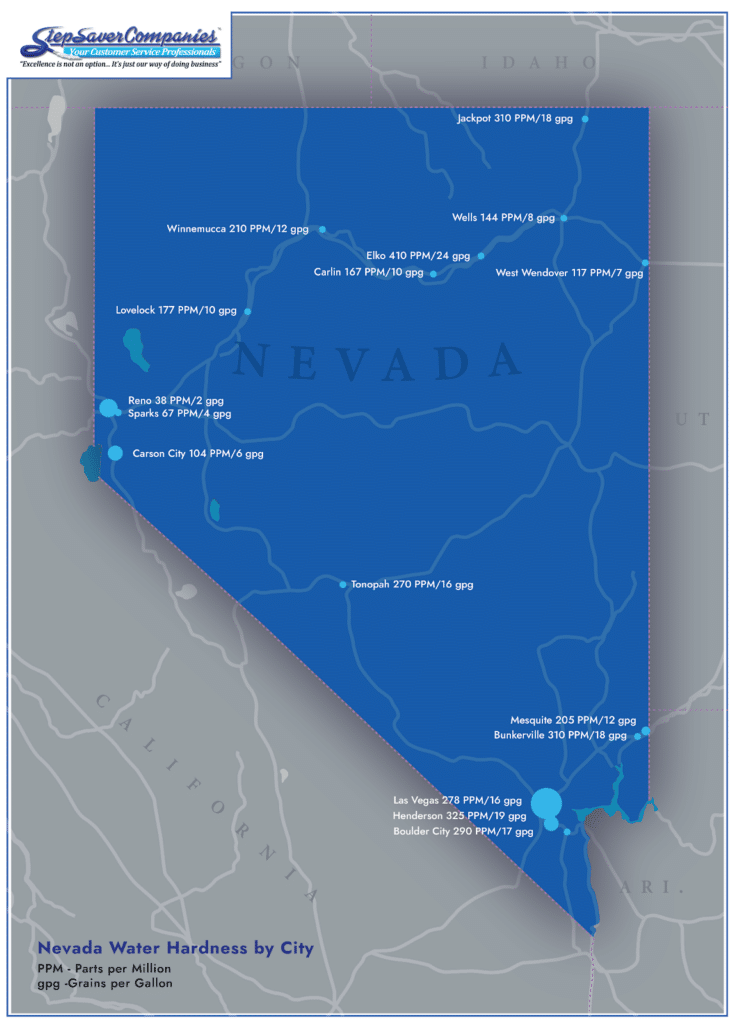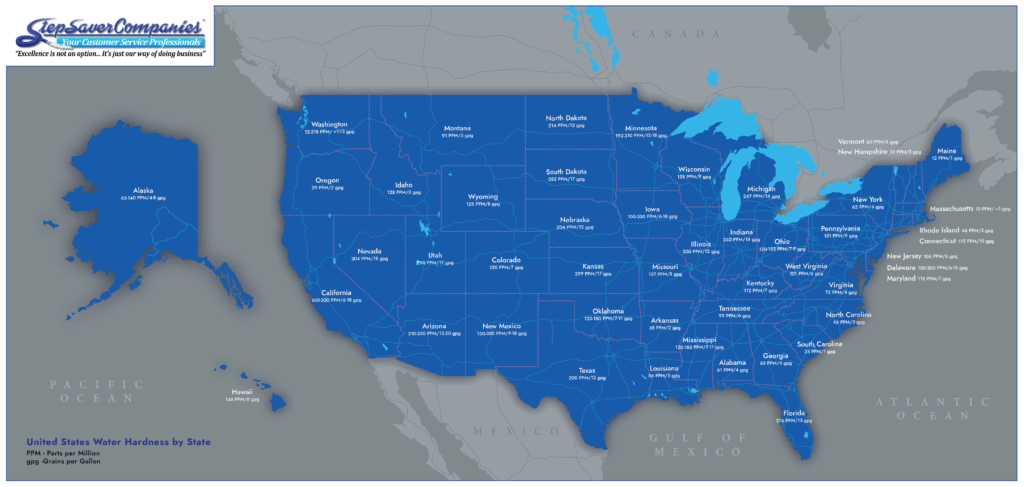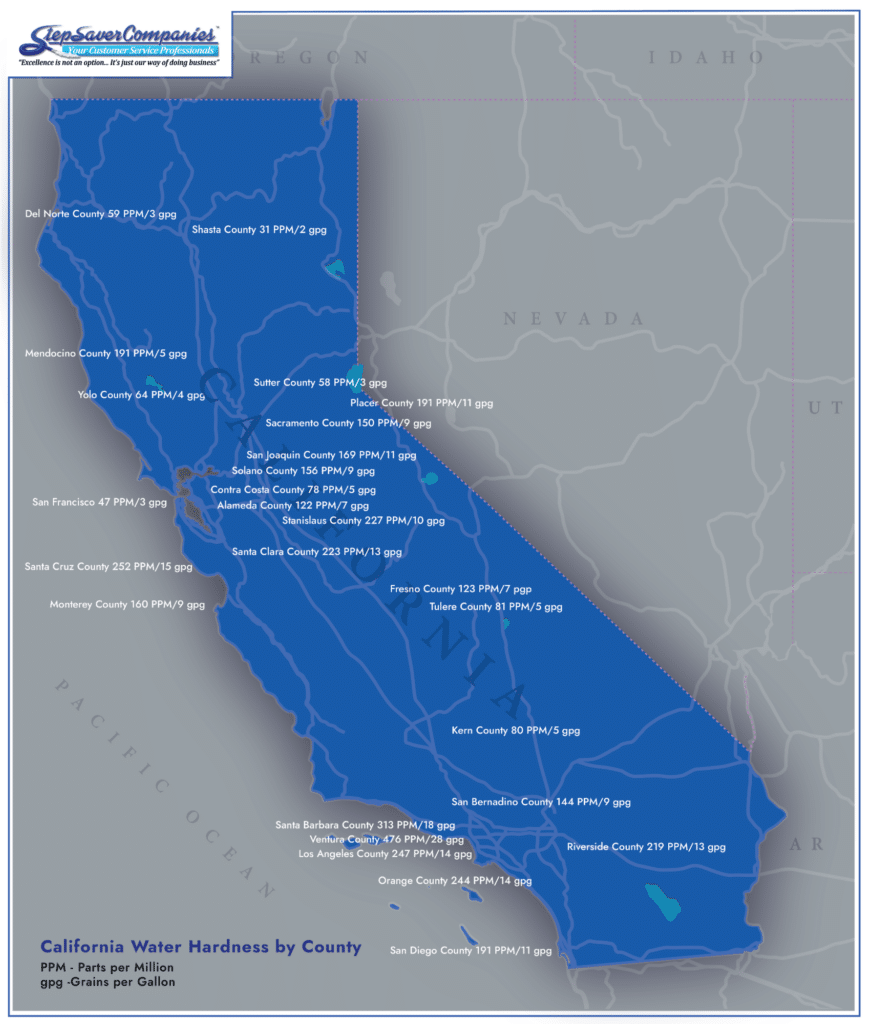Nevada is known for its arid climate and reliance on groundwater sources, which often contain high levels of minerals like calcium and magnesium. As a result, much of the state experiences hard to very hard water, impacting everything from plumbing and appliances to cleaning efficiency. While water hardness levels vary by region, cities like Las Vegas and Reno frequently deal with mineral buildup, making water treatment solutions essential for both homeowners and businesses.
In this guide, we’ll explore Nevada’s water hardness levels, how they compare across different areas, and what you can do to manage the effects of hard water in your home or business.
Does Nevada Have Hard Water?
Yes, Nevada generally has very hard water, especially in the city of Las Vegas. Hard water contains unnaturally high levels of minerals like magnesium and calcium, which can cause scale buildup in pipelines and equipment, stains on fixtures and appliances, poor quality drinking water, and more.
What causes Nevada’s water hardness? In cities like Las Vegas, nearly 90% of the water supply is from Lake Mead. The other 10% is collected from wells that tap into an aquifer beneath the Las Vegas Valley, the Basin Range Aquifers. The Basin Range Aquifers are naturally replenished by Spring Mountains precipitation. Most of the state relies solely upon these underground aquifers to provide water services outside of the highly populated cities. When rain falls, it collects in lakes (such as Lake Mead) and aquifers, where it gradually dissolves minerals from surrounding rock formations. The more minerals dissolved in the water, the harder it becomes, thus leading to hard water in Las Vegas and surrounding regions.
Nevada has some of the hardest water in the country, with high mineral concentrations throughout the state. Due to the high water, it’s crucial for Nevada residents, specifically business owners, to monitor their water quality and invest in water softening solutions to ensure their water meets quality standards.
Water Hardness Levels by City in Nevada
Nevada has a notably arid climate and boasts a diverse geological composition, including limestone and sedimentary rock formations, which contribute to the high mineral content of its water supply. Elko has the hardest water in the state, measuring 410 parts per million (PPM). In contrast, Nevada’s entertainment hub, Las Vegas, has a water hardness level of 275 PPM.
The map below shows how Nevada’s water hardness levels vary by city. Understanding the hardness of water in your region is crucial for determining the best way to obtain soft water for your needs.

How to Have Soft Water in Nevada: 3 Options to Choose From
In Nevada, where hard water is a common issue due to high mineral content, there are three primary ways to achieve soft water: a traditional water softener system, a salt-free water conditioner, and a reverse osmosis (RO) system. Each method offers unique benefits for homeowners and businesses looking to improve water quality and protect their plumbing, appliances, and overall operations.
1. Water Softener System
A traditional ion-exchange water softener is one of the most effective ways to remove calcium and magnesium, the minerals responsible for hard water. This system works by using resin beads to swap these hard minerals with sodium or potassium ions, significantly reducing scale buildup in pipes, water heaters, and appliances. Regular maintenance is required, including replenishing salt or potassium pellets and cleaning the resin bed.
For businesses, such as restaurants, hotels, and laundromats, a water softener can be crucial in maintaining equipment efficiency and longevity. Soft water helps prevent costly damage to commercial dishwashers, boilers, and washing machines while improving soaps and detergents’ effectiveness. This leads to cleaner dishes, softer linens, and overall better customer experiences.
2. Salt-Free Water Conditioner
A salt-free water conditioner does not remove minerals from the water but instead alters their structure using a process called template-assisted crystallization (TAC). This prevents calcium and magnesium from forming scale deposits on plumbing fixtures and appliances. Unlike traditional water softeners, salt-free systems require little to no maintenance, as there is no need for salt refills or brine tank cleaning.
Businesses that rely on plumbing efficiency but prefer a low-maintenance solution may benefit from a salt-free conditioner. While it does not provide the same level of softness as an ion exchange system, it can still reduce scale buildup in office buildings, coffee shops, and retail spaces. This can help lower maintenance costs and prolong the life of equipment without the added sodium found in traditional softeners.
3. Reverse Osmosis System
Reverse osmosis systems use a semipermeable membrane to filter out minerals, contaminants, and impurities from water. RO systems can remove up to 99% of substances like chlorine, fluoride, and heavy metals, making them an excellent choice for high-quality drinking and cooking water. While most RO systems are used at a single tap for drinking water, whole-house or commercial-grade RO units can provide soft, purified water for an entire property.
RO systems ensure that water quality does not interfere with taste and product consistency for businesses in the food and beverage industry, including coffee shops and breweries. Additionally, office buildings and medical facilities benefit from RO systems by providing employees and clients with clean, great-tasting water while protecting sensitive equipment from mineral buildup.
Which Water Softening Technique is the Best?
For homeowners and businesses in Nevada, selecting the right water treatment system depends on the level of water hardness and specific needs. A traditional water softener is ideal for businesses that require full-scale protection against mineral buildup, while a salt-free conditioner is a great low-maintenance alternative for reducing scale. Meanwhile, an RO system is best for those prioritizing purified drinking water or specialty applications that demand high water quality.
Step Saver’s Water Treatment Services for Nevada Residents
Don’t waste money constantly repairing or replacing your business’s equipment due to hard water damage. Protect your investment with Step Saver’s commercial water treatment solutions. Our experts offer installation, repair, and replacement services for water softeners and reverse osmosis systems, ensuring your business is running at peak performance year-round. Step Saver’s efficient salt delivery services ensure your water softening system operates at peak performance, preventing scale buildup and extending the lifespan of your equipment. With timely deliveries and high-quality salt, we help businesses and homeowners maintain consistently soft water without the hassle. Whether you’re experiencing negative customer feedback due to hard water or are having to consistently replace equipment because of aggressive wear and tear, we’re here to help.
With our guidance, you can focus on what matters most (operating your business) while we handle your company’s water treatment. Step Saver serves large cities throughout Nevada, including Las Vegas, Henderson, North Las Vegas, Reno, and more. Contact our Nevada team to experience the difference of 5-star water treatment solutions for your business.


